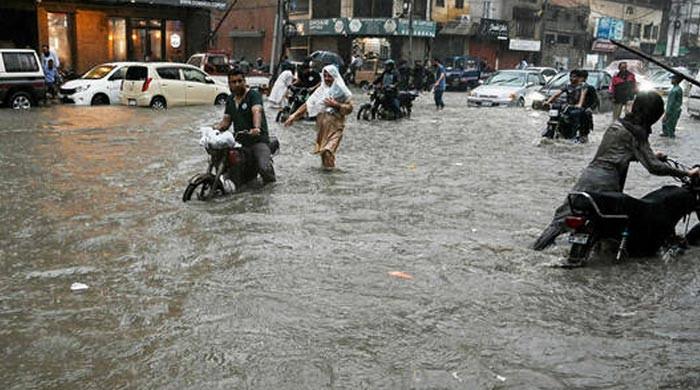Karachi Hit by More Monsoon Showers as System Persists
Several areas of Karachi experienced renewed monsoon rainfall on Thursday evening, influenced by the weather system over Keti Bandar, Sindh, and the northern Arabian Sea.
The Pakistan Meteorological Department (PMD) indicated that various localities in Karachi received rainfall, including Dalmia Road, Drigh Road, Gulshan-e-Iqbal, Gulshan-e-Maymar, Gulistan-e-Johar, MA Jinnah Road, Orangi Town, Hawksbay, and Mubarak Village.
A weather system bringing rain is currently impacting the city, and intermittent showers are anticipated to persist into the evening and night, according to a Met Office representative.
Tragically, intense monsoon rains have resulted in at least 17 fatalities in the densely populated port city over the past two days. The causes of death included drowning, traffic incidents, and electrocution.
The spokesperson further mentioned that the weather system is projected to weaken later tonight, with another monsoon system expected to enter Sindh around August 27.
“A new monsoon system is anticipated to enter Sindh on August 27, bringing rainfall to Karachi and other regions of Sindh until August 30,” the spokesperson stated.
The National Disaster Management Authority (NDMA) reports that over 700 monsoon-related deaths have occurred since the season commenced in late June.
During an appearance on a news program, Sindh Chief Minister Murad Ali Shah offered an apology to citizens affected by Tuesday’s heavy rainfall. “Urban flooding is unavoidable with such intense rain. I apologize to everyone for the flooding in Karachi, but water cannot be drained instantly with the push of a button,” he stated.
CM Murad clarified that he instructed the Commissioner to advise people to stay indoors as the rain intensified, but this message did not fully reach the public. “Everyone went out on the street,” he noted.
“Yesterday, there was also rain, and Sharea Faisal was completely blocked when I went out. I urge people to heed the government’s advice,” he added.
He emphasized the importance of patience and coordination in disaster management, adding that the drainage of water within five to six hours demonstrated effective efforts. “This is disaster management. Disasters cannot be avoided; they can only be managed,” he said. “If no work had been done, how could the water have been drained in 5–6 hours? Work was indeed done.”
“It requires time. We must understand that disasters must be managed; we cannot fight nature. Our error was allowing people to go out on the road; we should have closed it,” the CM concluded.



Comments (0)
No comments yet. Be the first to comment!
Leave a Comment